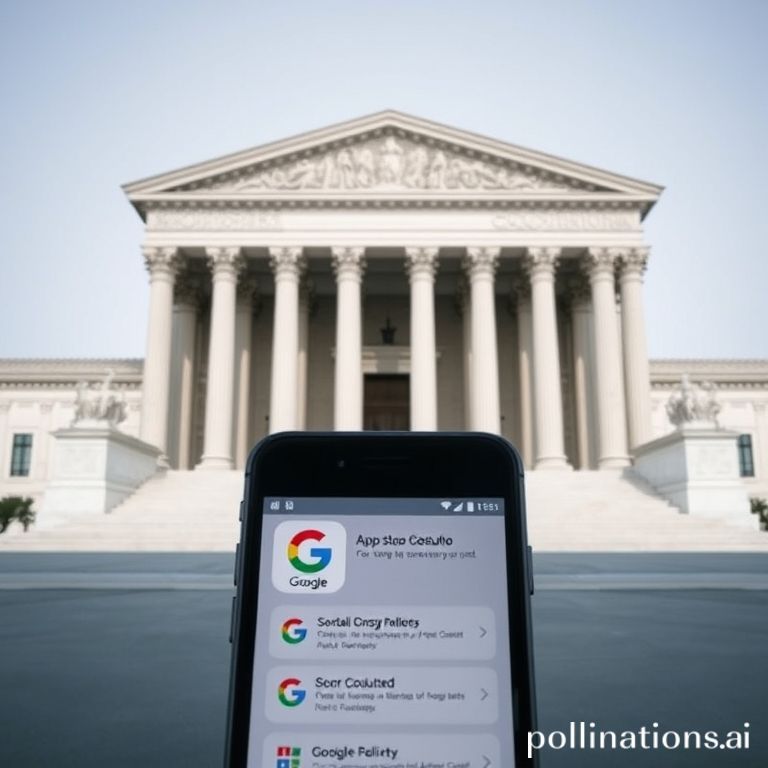
Google has recently approached the U.S. Supreme Court, seeking an urgent pause on a lower court’s mandate that demands significant alterations to its Play Store policies. The tech giant argues that implementing these changes would inflict "irreparable harm" upon both Google itself and the expansive Android ecosystem it maintains. This plea highlights a critical juncture in the ongoing antitrust battle, pitting a global technology leader against a prominent game developer, Epic Games, with profound implications for the digital economy.
The heart of this legal contention lies in a July ruling from a lower court, which emerged from the high-profile antitrust lawsuit initiated by Epic Games. This ruling necessitates that the Google Play Store dismantle its current restrictions that prevent developers from establishing their own alternative marketplaces and integrating their proprietary billing systems. The injunction, as reported, is scheduled to become effective on October 22, setting a tight deadline for Google to comply with the sweeping changes.
Google's appeal to the Supreme Court underscores its deep concerns regarding the operational and security ramifications of the imposed changes. The company contends that allowing multiple payment systems and third-party app stores could compromise the security integrity of the Android platform, potentially exposing users to various risks. Furthermore, Google argues that these changes could disrupt the carefully curated user experience and hinder the innovation cycle that has characterized the Android ecosystem for years. The current model, Google asserts, allows for significant investment in platform development, security features, and developer support, which could be jeopardized if its revenue streams are significantly impacted by open competition within its ecosystem.
The Genesis of the Dispute: Epic Games vs. Google
The legal saga commenced when Epic Games, the creator of the globally popular game Fortnite, filed a lawsuit against Google, accusing the company of monopolistic practices. Epic's central argument was that Google had unlawfully monopolized how consumers access applications on Android devices and how payments are processed within these applications. They contended that Google's policies stifled competition, forced developers into an unfavorable revenue-sharing model, and ultimately limited consumer choice and inflated prices.
Following a rigorous month-long trial, a jury delivered a landmark verdict in December 2023, finding that Google’s app store indeed held a monopoly in the Android app distribution and payments market. This ruling sent ripples across the tech industry, signaling a potential shift in how digital platforms could operate and interact with developers and consumers alike. The jury’s decision underscored the growing scrutiny faced by large tech companies regarding their market dominance and competitive practices.
Mandated Changes and Their Far-Reaching Impact
In October 2024, a judge issued a detailed order outlining the specific policy modifications Google must implement. These changes are designed to foster a more competitive environment and dismantle practices deemed anti-competitive. Key mandates include:
- **Prohibition on Exclusive Deals:** Google will be barred from offering financial incentives to developers to exclusively use its app store, thereby encouraging wider distribution.
- **Developer Communication Freedom:** Developers must be allowed to inform consumers about alternative methods to download their applications directly, bypassing the Google Play Store.
- **Flexible Billing Systems:** Google can no longer compel developers to exclusively utilize its in-app billing features, paving the way for third-party payment processors.
- **Rival App Store Access:** Google must provide rival app stores with access to its application catalog, potentially simplifying the process for users to find and install apps from different sources.
These injunctions represent a significant overhaul of Google's long-standing business model for its app store. They aim to inject greater competition, empower developers with more autonomy, and offer consumers increased choices in how they discover and pay for digital content.
Voices from Both Sides: Arguments and Counter-Arguments
Epic Games' spokesperson, Natalie Munoz, has vociferously defended the lower court’s ruling. She stated that Google continues to rely on "flawed security claims" which have been previously dismissed by a jury and the 9th Circuit Court of Appeals. Munoz emphasized that the court’s injunction should be enforced without delay, asserting that consumers and developers stand to gain substantially from enhanced competition, a broader range of choices, and ultimately, more favorable pricing.
Conversely, Google has persistently sought to challenge the ruling, even after losing an appeal in July. During its earlier appeal, Google argued that it was unfairly prevented from demonstrating to the jury that it competes directly with Apple's App Store, suggesting a broader market context that the jury allegedly overlooked. Furthermore, Google contended that the case, given its injunctive relief nature, should have been presided over by a judge rather than a jury. Despite the setbacks, Google reiterated its commitment to pursuing further appeals, signaling a protracted legal battle.
Lee-Anne Mulholland, Google's vice president of regulatory affairs, underscored the company’s apprehensions in July. She warned that the ruling "will significantly harm user safety, limit choice, and undermine the innovation that has always been central to the Android ecosystem." This statement encapsulates Google's primary defensive stance: that its current app store framework is essential for maintaining a secure, vibrant, and innovative platform for millions of users and developers worldwide.
Looking Ahead: The Future of App Ecosystems
The Supreme Court’s decision on Google’s request for a stay will have profound implications, not just for Google and Epic Games, but for the entire digital ecosystem. A decision to uphold the lower court's ruling could set a precedent for how other major digital platforms manage their app stores and interact with third-party developers. It could usher in an era of more open mobile ecosystems, potentially fostering greater competition and innovation at the developer level, while simultaneously raising complex questions about platform security, revenue models, and consumer trust.
The ongoing legal contest between Google and Epic Games symbolizes a broader global conversation about digital market regulation, antitrust enforcement, and the balance between platform control and developer freedom. As the October 22 deadline looms and Google appeals to the highest court, the tech world watches intently for a resolution that could reshape the future of app distribution and digital commerce.
